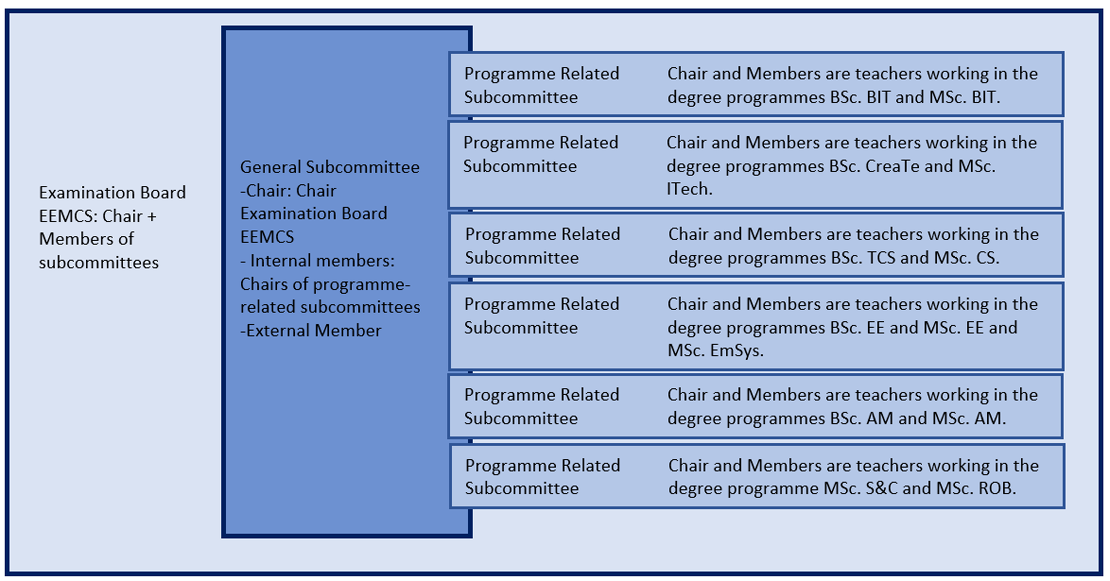According to the Dutch Higher Education and Research Act (WHW) each educational programme or group of programmes has an Examination Board. The Examination Board EEMCS consists out of seven sub-committees: six programme specific sub-committes and one sub-committee (EB-GA) consisting out of the chairs of the programme specific sub-committees, an external member and the chair of the entire Examination Board EEMCS.

Roles and tasks members
The tasks and responsibilities of the Examination Board are regulated in the Dutch Law for Higher Education and Research and the Faculty Policy of the Faculty EEMCS.
Within EEMCS, a task division is agreed upon between the subcommittees of the Examination Board EEMCS:
Programme related subcommittees
The programme related subcommittees consist of members of the academic staff and have independent authority about all matters related to the exams belonging to the study programme in question. This includes but may not be limited to:
- determining whether a student has fulfilled the conditions with regard to knowledge, insight and skills as stated in the EER in order to receive a degree in one of the EEMCS programs;
- Deciding on student requests related to the composition of their programme and/or deviations from the regular course of assessment;
- Investigating and deciding upon suspisions of academic misconduct;
- appointing examiners for administering and grading tests and exams
- safeguarding the quality of assessment of the programme
The Subcommittee for general Affairs (EB-GA)
The Subcommittee for General Affairs consisting out of the chairs of the programme specific sub-committees, an external member and the chair of the entire Examination Board EEMCS is occupied with Examination Board EEMCS' general affaires. These include but may not be limited to:
- Setting out policy for safeguarding quality of testing and examination at faculty level;
- Annual revision of the Rules & Guidelines of the Examination Board;
OFFICE OF REGISTRARS
Each programme related subcommittee is supported by a registrar. The executive secretary is a (legal) advisor to the Examination Board in general and supports the EB-GA. Together, the executive secretary and registrars form the Office of Registrars. They are not members of the Examination Board.
MANDATES
‘Mandate’ means the power to take decisions in the name of a administrative body (the Examination Board) or to exercise powers in the administrative body’s name. An administrative body may mandate a power, unless a statutory provision states otherwise or the nature of the power is incompatible with mandate. The power to sign specific documents may be mandated, unless provided otherwise by law or the nature of the power is incompatible with mandate. The decision must show that the administrative body itself took the decision.
If the Examination Board mandates powers, it will still be ultimately responsible for the decisions taken by the party to which the mandate has been given. If the mandated party is not operating under the responsibility of the mandate provider (the Examination Board), the mandate must be accepted by the mandated party and, where appropriate, the party under whose responsibility he or she is operating. The power must be mandated in writing.
The Examination Board may still exercise the mandated power and may revoke (in writing) the mandate at any time.
The Examination Board may, on a case-by-case basis or generally, give instructions to the mandated party on exercising the mandated power. At the Examination Board’s request, this mandated party must provide information on the exercising of the power.
